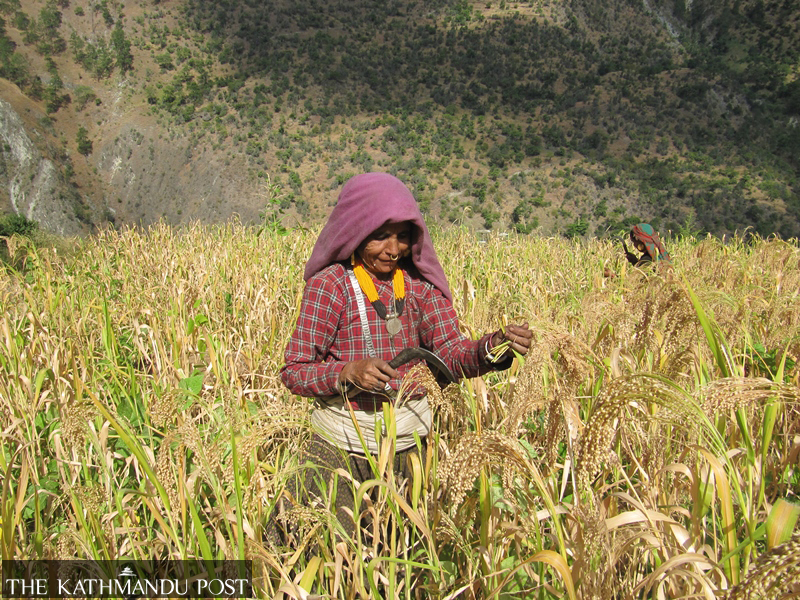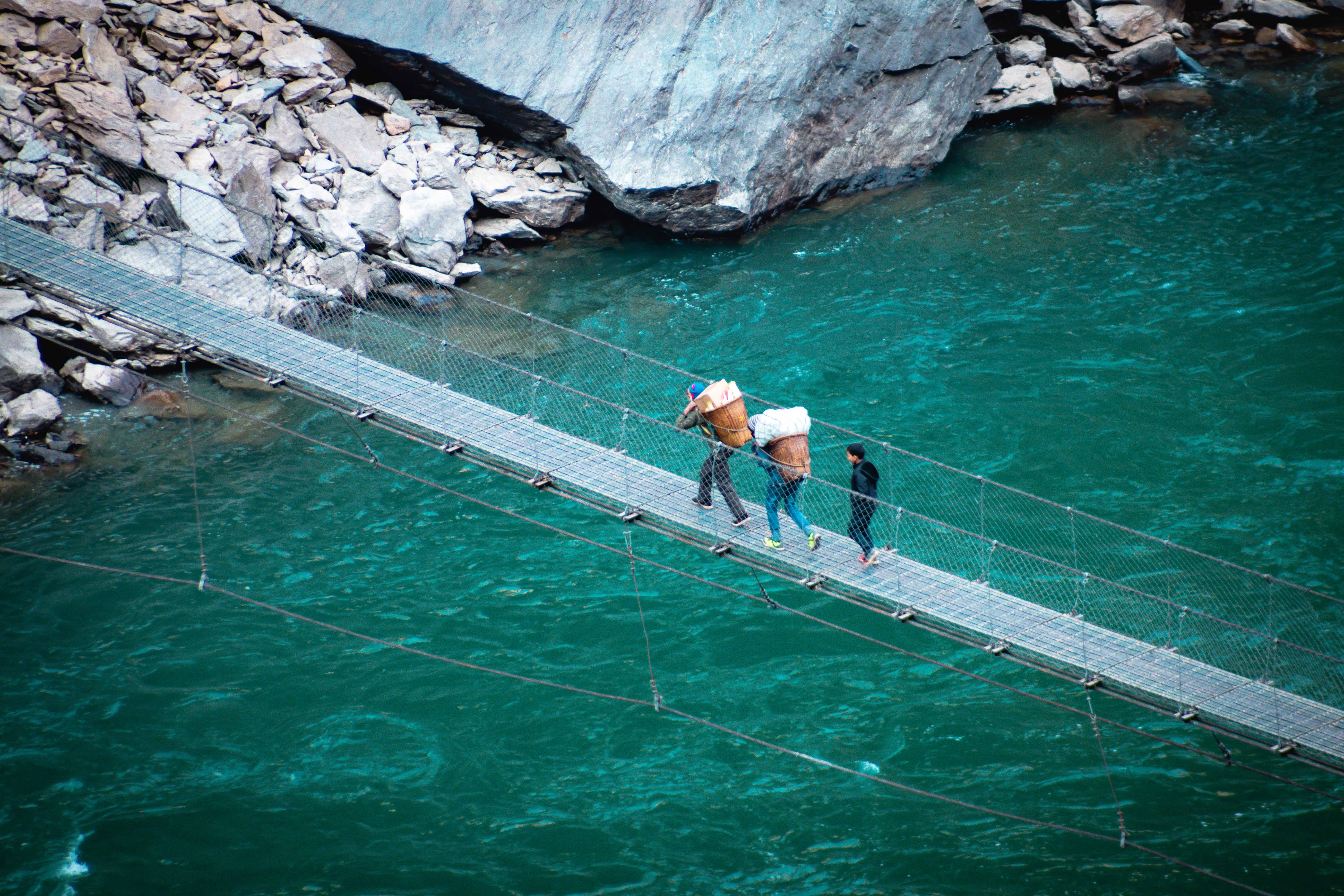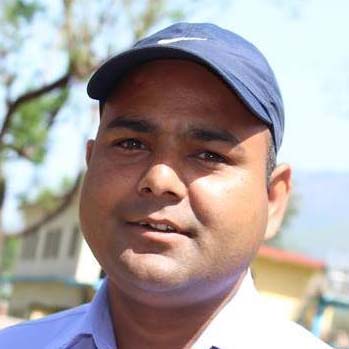Money
Karnali emerges in new avatar as exporter of cereals
Farmers here grow foxtail millet, proso millet, kali marsi rice, buckwheat and varieties of beans, all of which are shipped to Kathmandu.
Krishna Prasad Gautam
Bhim Bahadur Budha of Chakheli Rural Municipality, Humla grew 1.3 tonnes of foxtail millet (kaguno) on his farm this year, all of which was snapped up by traders and shipped to Kathmandu.
"Nobody in my family likes kaguno. I planted it so that my field would not lie barren,” he said.
Foxtail millet was once widely grown in the Karnali region which is considered to be the remotest part of the country. In recent years, the crop has been pushed out by rice and sweet potato.
But foxtail millet has found new fans as a healthy food because it is rich in calcium, especially in the country's capital where cereals grown in distant districts have lately become fashionable.
Sur Bahadur Shahi, a farmer from Jumla, sold 3 tonnes of marsi paddy this year which was dispatched to Kathmandu.
Located in the far west and the largest province in Nepal, mention of Karnali evokes images of annual food shortages and airdrops of grain. The region has long been deemed a food-insecure region, leading the government to dispatch hundreds of tonnes of subsidised rice every year.
But Karnali's usual image is misleading. When people say food shortage, what they actually mean is rice shortage.
"Until a few years ago, we used to consider only white rice as grain," Shahi said. "The grain produced in Karnali now is much more expensive than rice."
The mountainous region of Karnali is a rich habitat of special grain varieties. Farmers here grow foxtail millet, proso millet (chino), kali marsi rice, buckwheat and varieties of beans, all of which are shipped to Kathmandu Valley. Kali marsi rice is grown up to an elevation of 2,790 metres, the highest in the world.
"These are the foods people in Karnali once ate. They were known as food for poor people. But these foods are now in high demand among people in urban regions," said Shahi.
Farmers get premium prices for their harvests if they are sold in urban markets. Proso millet costs Rs160 per kg, foxtail millet Rs150 per kg and marsi rice Rs180 per kg in the local markets. But in Kathmandu, proso millet fetches up to Rs250 per kg and marsi rice a whopping Rs700 per kg.
Last year, farmers in Humla planted foxtail millet on 78 hectares and reaped a harvest totalling 81 tonnes.
Black foxtail millet is grown in the highlands of Humla.
Ayurvedic doctor Bhakta Bahadur KC says black foxtail millet is very good for health. "It is the most important source of diet for pregnant women,” he said. "Millets are also vital to tackle the problem of malnutrition."
Bakhat Bahadur Khadka, chief of the Agriculture Development Office in Humla, said that Humla grows millet worth Rs1.5 million annually. "Here in Humla, everyone considers only white rice as food," he said. “Humla has not been able to understand the potential of the crops it grows.”
Black marsi, a paddy particularly grown in Jumla, is also sold in Nepalgunj and Surkhet. Everyone who visits Jumla does not forget to bring a bag of black marsi rice as a gift.
Nanda Ram Neupane of Tatopani-5, Jumla says traders visit farmers door to door looking for the expensive rice. It is difficult to cultivate black marsi paddy compared to other paddy varieties, according to him.
"With the advent of modern varieties of paddy, incidences of pests have increased. But as demand for black marsi rice is increasing in the market, we are excited to cultivate it on a commercial scale,” Neupane said.
“Black marsi paddy is the identity of Karnali and it can change the fortune of Karnali if grown commercially.”
Farmers have started commercial cultivation of black marsi in Sinja and Tatopani. According to farmers, local traders exported 15 tonnes of black marsi rice grown in Jumla to Canada last year.

The Agriculture Development Office has implemented a programme with the local level government for the commercialisation of black marsi. In Jumla, paddy is cultivated on 2,900 hectares, and the marsi acreage is 1,600 hectares. Jumla produced 4,000 tonnes of marsi last year.
Sales of marsi rice have increased in department stores and malls in the cities.
In Mugu and Kalikot also, the number of farmers cultivating marsi paddy is increasing. Last year, 1,143 tonnes of marsi was produced in Kalikot and 1,046 tonnes in Mugu.
Paediatrician Dr Nawaraj KC of the provincial hospital in Karnali says marsi rice is rich in fibre and good for diabetics and blood pressure patients. Marsi also contains a balanced amount of nutrients including iron and starch.
Another crop which is becoming endangered in Karnali is proso millet. Demand for this crop has grown significantly in urban areas.
Chopsang Lama of Bargau of Simkot Rural Municipality in Humla sold 700 kg of proso millet this year. “Proso millet fetches Rs160 per kg when we sell it from home,” she said.
Lama’s neighbour Kesang Tamang has also supplied 3 tonnes of proso millet to urban areas. "In the past, we used to give proso millet to people for free," she said. “Now traders contact us frequently and quote the price in advance.”
Simkot-based Sowarna Food Industries has produced proso millet biscuits for the first time and shipped them to market.
Company director Mukunda Rokaya said that the factory produced 1,000 packets of proso millet biscuits in the first lot and supplied them to Kathmandu. The price of the biscuits has been fixed at Rs65 per piece.
In Humla, proso millet is cultivated on 400 hectares, according to the District Agriculture Development Office.
Dr KC says proso millet increases memory power, controls high blood pressure and strengthens bones. The crop is grown in all the mountainous districts of Karnali.
"The tendency of Karnali people to eat only rice as the main food has not been abated," said Dipendra Rokaya, former member of the Karnali Province Planning Commission.
Karnali's economy has weakened due to a decline in traditional agricultural production, closure of trade points on all sides, limitation of goods and prices and fall in the livestock business.
Food Management and Trading Company spent about Rs700 million last year to transport subsidised food to Karnali.

According to the Provincial Planning Commission, Karnali has 299,000 hectares of land suitable for cultivation, but only 216,000 hectares has been utilised.
Karnali produces 390,000 tonnes of food grain annually and has a deficit of 16,000 tonnes.
According to the Ministry of Land Management, Agriculture and Cooperatives, Karnali produced 20,868 tonnes of millet on 19,076 hectares last year. Farmers also grew 13,075 tonnes of proso millet on 18,072 hectares and 575 tonnes of foxtail millet on 948 hectares.
"About half of the grain output was supplied to other districts," said Kisan Lal Bhatta, secretary of the ministry.
Chief Minister Jeevan Bahadur Shahi of Karnali Province said that the practice of “begging with a golden bowl” should end in Karnali. "We have everything. We survive on white rice by selling proso millet, millet and other crops," he said. “The habit of eating only rice should end.”
Shahi says the common image of food shortages in Karnali is a result of the white rice eating habit. “We should not be dependent on rice. We should begin commercial farming of local and traditional crops. There is high demand for our products.”
Food Management and Trading Company is also buying Karnali proso millet and beans this year. The state-owned firm, which started procuring marsi rice from last year, supplied 5 tonnes of rice to Kathmandu. This year too, the company has started to procure marsi rice.
It has been selling beans for five years, and is buying 30 tonnes of marsi rice from Surkhet, 20 tonnes from Humla and 100 tonnes from Jumla this year.
According to Madhav Mishra, chief of the company's regional office in Surkhet, they have been buying proso millet, foxtail millet and other crops. He said the company would be procuring about 50 tonnes of food grain from Karnali this year.




 15.12°C Kathmandu
15.12°C Kathmandu














